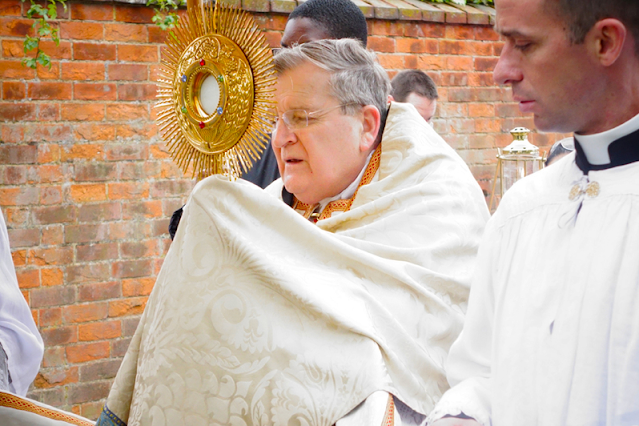May God grant Cardinal Burke many years
Liturgy fan, church lawyer and Pope critic: Cardinal Raymond Leo Burke turns 75 today - under Benedict XVI he made a career in the Vatican. But Pope Francis also seems to value his expertise - despite criticism of his Pontificate.
The 75th birthday is not a drastic date for Cardinal Raymond Burke. Unlike diocesan bishops, the age limit for curial offices is 80. And so Burke will continue to carry out the few activities in the Vatican that remain to him.
For example, Burke is a member of the very exclusive "Council of Cardinals and Bishops", which has existed since 1988 and which, apart from the Cardinal Secretary of State, includes only five other cardinals. The powers of this Council have not really been clarified even after the recent reform of the Curia.
Burke is also a member of the canonisation authority; and in the Supreme Court, which he once headed, he has been a judge again for some years. In addition, he attends all the cardinals' consistories - and presumably also the next conclave. Whenever all the cardinals meet in Rome, he is one of the visible spokespersons for the conservatives and brings their criticism of the Pope's course to the floor. But it is difficult to assess how far his influence reaches. Burke had to give up one of his few remaining posts, that of "patron" for the Knights of Malta, only a few days ago.
Burke was born on 30 June 1948 in a small town in Wisconsin, the youngest of six children. He studied at the Pontifical Gregorian University, among other places, in the turbulent 1970s after the Second Vatican Council. In 1995, Burke became bishop of his home diocese of La Crosse, and in 2004 archbishop of the Saint Louis metropolis.
In 2008, Benedict XVI appointed the excellent canon lawyer as president of the Apostolic Signature; he was thus the highest judge in the Vatican after the Pope. In 2010, he became a cardinal. Benedict XVI and Burke shared a fascination for the "Old Mass" - and for clear principles in Church teaching.
Under Pope Francis, the pillars of dogmatics, moral theology and canon law were noticeably relativised by soft principles such as mercy and pastoral empathy. As a result, men like Burke found themselves in opposition. Burke showed that he did not want to go along with the new course at the first Synod of Bishops on the family in October 2014. Even a Pope cannot change the Church's teaching on the indissolubility of marriage, he stressed at the time. He was therefore against it when the Pope wanted to open up the possibility that Catholics in second marriages could also take communion under certain circumstances.
A few weeks later, Francis dismissed him as the highest church judge. Burke was no longer allowed to participate in the second round of the World Synod of Bishops on the Family in October 2015. This did not prevent him from criticising the results. On the indissolubility of marriage, a question of faith, the Synod's decision lacked the necessary clarity, Burke wrote at the time.
When Francis declared the reception of communion for remarried divorcees possible in a footnote in the Pope's letter "Amoris laetitia" in April 2016, the canon lawyer saw the Rubicon crossed. Together with Cardinals Walter Brandmüller, Carlo Caffarra and Joachim Meisner, he wrote a letter to the Pope in September 2016. In five "doubts" (Latin: "dubia"), they asked whether this opening was really permitted and compatible with Church teaching.
Doubts about the Pope: When four cardinals published their "dubia".
The reception of Communion by remarried divorcees has been debated for a long time. More papal than the Pope, four cardinals spoke out clearly against it in a spectacular act in 2016.
The text contains Anglo-Saxon humour and crystal-clear dogmatic argumentation; it is therefore likely to have been mostly penned by Burke. Francis has always remained silent on the "dubia". Nevertheless, he has not broken with Burke once and for all.
When he needed a special investigator in February 2017 to clear up a serious case of abuse on Guam in the Pacific, he sent Burke there. A year later, the archbishop there was removed from office. Francis made it clear that he continued to value Burke, a church lawyer, when he reappointed him as a judge on the Supreme Church Court in September 2017.
Burke points out weaknesses in Papal letters
Burke had another public conflict with the Pope in July 2021. When Francis withdrew the previous tolerance for the rite of the "Old Mass" by "Motu Proprio", Burke published a sharp critique. In it, he pointed out canonical, historical and theological weaknesses in the Pope's letter.
As in earlier critical statements, he stressed that he had written his remarks "as a bishop, as a cardinal, in communion with the Roman Pontiff and with a special responsibility to support him in his pastoral care and in the governance of the universal Church". So Pope Francis can continue to rely on the unsparing loyalty of his most brilliant critic.
Given the Source- surprisingly sympathetic!










.jpeg)

Comments